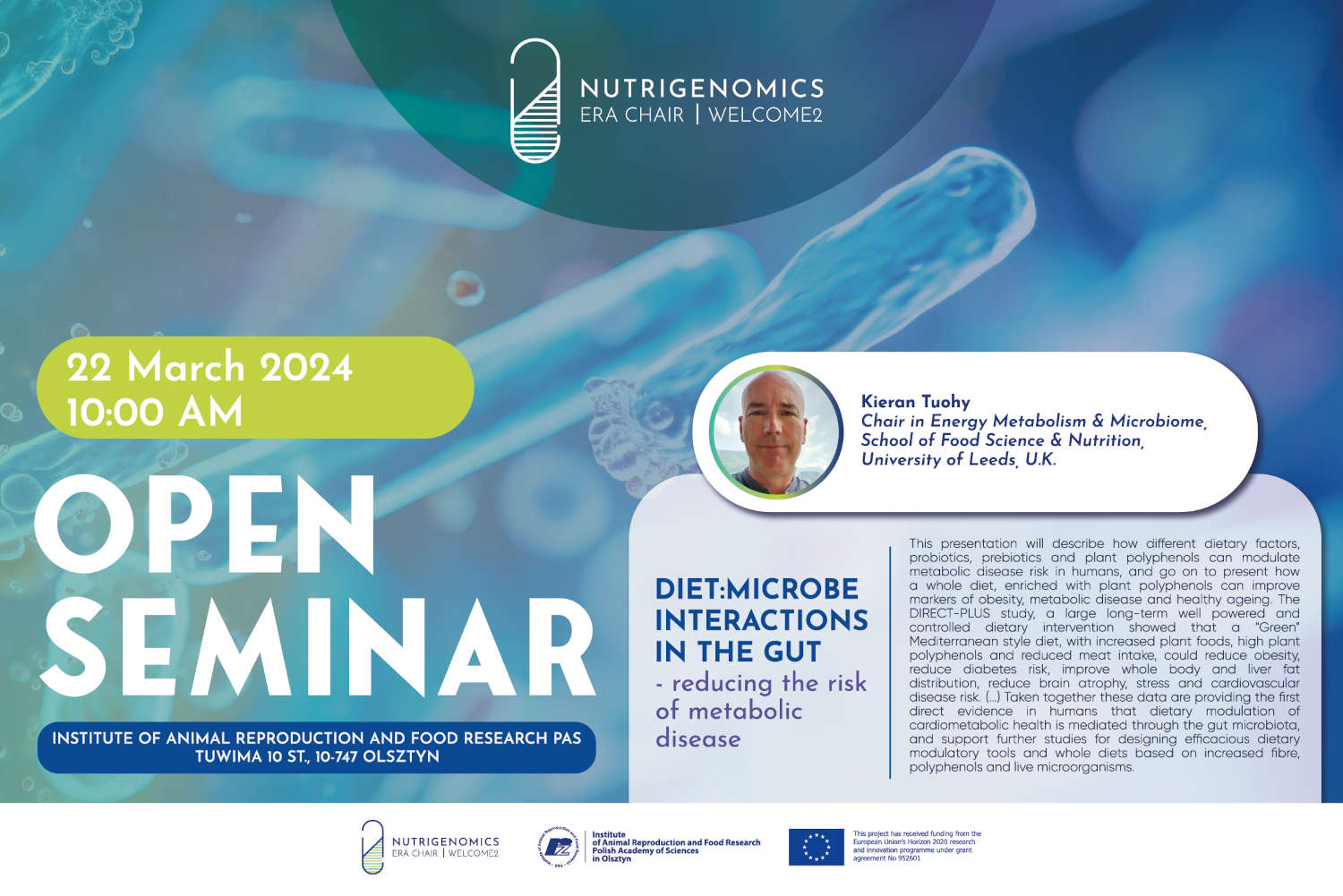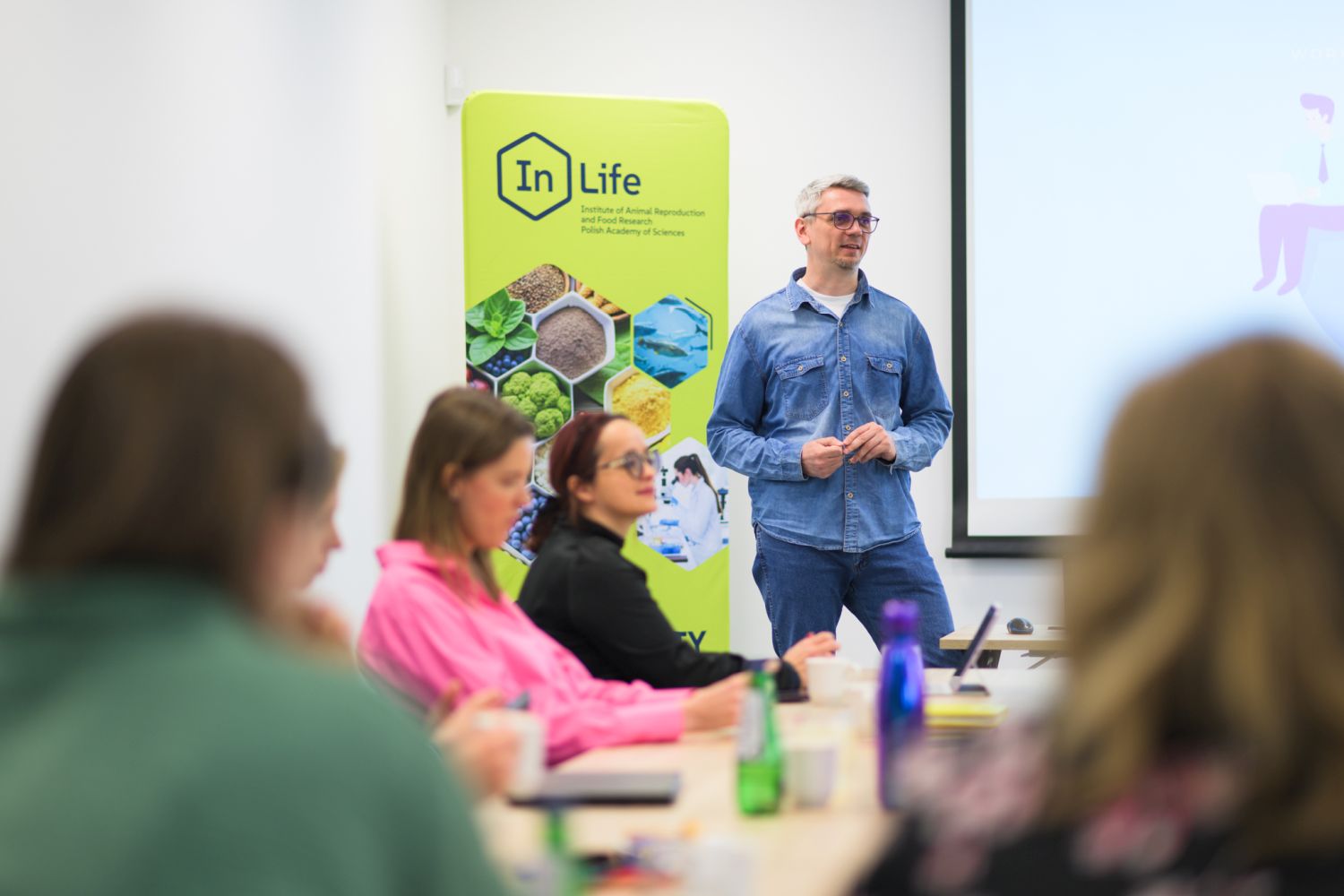We are back with a series of international scientific seminars held as a part of the WELCOME2 ERA Chair project. Our guest will be Kieran Tuohy, Professor of Energy Metabolism and Microbiome at the University of Leeds (UK), specialist in nutrition, gut microbiology and diet: microbiome interactions.
The seminar “Diet – microbe interactions in the gut: reducing the risk of metabolic disease” will be held on 22 March at 10:00 am at the Institute of Animal Reproduction and Food Research PAS (Tuwima 10 Str., Olsztyn).
PROFESSOR KIERAN TUOHY – BIO
Born in Mayo, Ireland, Dr Kieran Tuohy received his PhD from the University of Surrey (UK) in 2000 after graduating from University College Dublin, Ireland (BSc, Industrial Microbiology). He also holds an MSc in Environmental Microbiology from the University of Aberdeen. After training as a post-doctoral researcher Kieran was appointed lecturer in Food Metabonomics at the Department of Food Science and Nutrition, University of Reading. He led the Nutrition and Nutrigenomics Group at the Fondazione Edmund Mach in Trento, Italy between 2010- 2022, was Head of Department of Food Quality and Nutrition (2017-2022) and in February 2022 was appointed chair in Energy Metabolism and Microbiome at the School of Food Science & Nutrition, University of Leeds, UK.
Kieran is the Editor in Chief of the European Journal of Nutrition. His publication record includes over 195 international peer reviewed articles and book chapters in the areas of food chain microbiomes, nutrition, gut microbiology and diet:microbiome interactions. Today Kieran is co-lead on the BBSRC funded ORIC hub, INFORM, which is designed to investigate the role of functional foods and beverages, probiotics, prebiotics and plant stanols to improve health and recovery.
DIET – MICROBE INTERACTIONS IN THE GUT – REDUCING THE RISK OF METABOLIC DISEASE – ABSTRACT
The human intestinal microbiome has emerged as an important contributor to metabolic disease risk. Intestinal permeability leads to chronic systemic low-grade inflammation which triggers pathological changes contributing to insulin resistance. Immune and metabolic regulatory mechanisms have been identified for microbially produced or modified metabolites like shorty chain fatty acids (acetate, propionate and butyrate), bile acids, small phenolic acids from plant phytochemical metabolism and amino acid derivatives including neurotransmitters. Although the mechanistic evidence demonstrating the biological activities of these metabolites largely derives from animal studies, we are beginning to get reproducible cause and effect demonstration in humans that modulation of the gut microbiota, and as a result, its metabolite output can impact on markers of cardiometabolic disease. This presentation will describe how different dietary factors, probiotics, prebiotics and plant polyphenols can modulate metabolic disease risk in humans, and go on to present how a whole diet, enriched with plant polyphenols can improve markers of obesity, metabolic disease and healthy ageing. The DIRECT-PLUS study, a large long-term well-powered and controlled dietary intervention showed that a “Green” Mediterranean style diet, with increased plant foods, high plant polyphenols and reduced meat intake, could reduce obesity and diabetes risk, improve whole body and liver fat distribution, reduce brain atrophy, stress and cardiovascular disease risk. Microbial metabolites in many cases were correlated with improved markers of metabolic disease and moreover, diet induced changes in gut microbiota profile proved predictive of improved metabolic and cardiovascular health. Finally, autologous faecal microbiome transplant of Green-Med diet modified gut microbiota prevented weight rebound and supported retreat from diabetes compared to a placebo treatment. Taken together these data are providing the first direct evidence in humans that dietary modulation of cardiometabolic health is mediated through the gut microbiota, and support further studies for designing efficacious dietary modulatory tools and whole diets based on increased fibre, polyphenols and live microorganisms.






